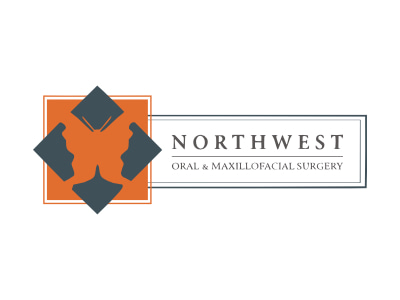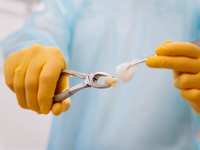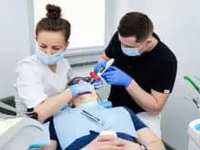- Categories :
- More
Unwrap the Benefits of Wisdom Teeth Removal this Holiday Season

The holiday season often brings joy, celebration, and quality time with friends and loved ones. Amid the festive spirit, it might be surprising to consider wisdom teeth removal as part of your holiday plans.
However, this time of year offers unique advantages for the procedure, especially for younger individuals on winter break from high school or college.
This can be a busy time of the year for the board-certified surgeons at Northwest Oral & Maxillofacial Surgery as the typical wisdom tooth extraction patient is between the ages of 17 and 25 and this demographic can have the procedure done over the winter break and get some TLC from their family during recovery without worrying about following behind on their studies.
Why the Holidays Are Ideal for Wisdom Teeth Removal
Experience has taught Northwest Oral & Maxillofacial Surgery that their patients find scheduling wisdom teeth removal during the holidays is not only practical but also beneficial, from the convenience of time off to the opportunity to utilize expiring insurance benefits.
Let's look at three main reasons to consider wisdom teeth removal over winter break:
- Winter Break Convenience
- For Students: Younger individuals, often in high school or college, can take advantage of the winter break to undergo the procedure without interfering with their academic commitments.
- Family Support: Being at home during the holidays allows for family support during the recovery period.
- For Students: Younger individuals, often in high school or college, can take advantage of the winter break to undergo the procedure without interfering with their academic commitments.
- Expired Insurance Benefits
- Utilizing Benefits: Families typically have insurance benefits that may expire by the end of the year. Scheduling wisdom teeth removal can be a wise use of these benefits before they reset on Jan. 1, 2024.
- Understand Your Dental Plan: The Society for Human Resource Management reported that while dental insurance is considered a “must-have” employee benefit, only half of employees feel that their employer provides enough information about what is covered under their plan. And some studies have shown only 3 percent of patients with dental insurance fully max out their benefits each year.
- Utilizing Benefits: Families typically have insurance benefits that may expire by the end of the year. Scheduling wisdom teeth removal can be a wise use of these benefits before they reset on Jan. 1, 2024.
- Time for Recovery
- Extended Time Off: Many people enjoy extended time off during the holidays, providing ample time for recovery without the stress of work or school. Sitting on the couch and watching your favorite holiday movie such as Elf or Home Alone!
- Extended Time Off: Many people enjoy extended time off during the holidays, providing ample time for recovery without the stress of work or school. Sitting on the couch and watching your favorite holiday movie such as Elf or Home Alone!
Wisdom Teeth Removal Essentials
It’s important for patients, and depending on their age, their parents, to understand the essentials of wisdom teeth removal.
Wisdom teeth extraction or removal is a surgical procedure to remove one or more of your wisdom teeth (third molars) which are situated in the four back corners of your mouth.
“If a wisdom tooth doesn't have room to grow (impacted wisdom tooth), resulting in pain, infection, or other dental problems, you'll likely need to have it pulled,” explains the Mayo Clinic. “To prevent potential future problems, some dentists and oral surgeons recommend wisdom tooth extraction even if impacted teeth aren't currently causing problems.”
Wisdom teeth appear (usually between the ages of 17 and 25) in different ways for different people:
- Some patients have their wisdom teeth erupt (breaking the surface of the gum) normally like all their other teeth with no complications.
- Some patients will never develop wisdom teeth.
- Other patients will have impacted wisdom teeth which do not have enough room to grow and may erupt partially or not at all, trapped below the gum line.
The Mayo Clinic says an impacted wisdom tooth may:
- Grow at an angle toward the next tooth (second molar).
- Grow at an angle toward the back of the mouth.
- Grow at a right angle to the other teeth, as if the wisdom tooth is "lying down" within the jawbone.
- Grow straight up or down like other teeth but stay trapped within the jawbone.
Northwest Oral & Maxillofacial Surgery often removes wisdom teeth of patients due to issues such as impaction, misalignment, or overcrowding.
Delaying wisdom tooth removal can lead to complications, such as infections, cysts, or damage to adjacent teeth.
Recovery Time During the Holidays
Understanding the recovery process is key to successful wisdom teeth removal. The holidays can be a big help as they provide an ideal environment for a relaxed and comfortable recovery.
Here are some recovery facts to keep in mind:
- Average Recovery Time
- Initial recovery: 2-3 days.
- Full recovery: 1-2 weeks.
- The Cleveland Clinic says that most people can resume school, work, and other routines in about 3 to 5 days.
As in all surgical procedures, it is very important to follow all your oral surgeon's post-operative instructions. Typically, patients are instructed to:
- Follow post-operative care instructions.
- Avoid strenuous activities.
- Use ice packs to reduce swelling.
- Take prescribed medications as directed.
Questions You May Have While Recovering from Wisdom Teeth Removal
It’s not unusual for patients to have questions after their wisdom teeth removal over the holidays. The Mayo Clinic answers some frequently asked questions:
- I see blood in my mouth, is that normal? Some oozing of blood may occur the first day after wisdom tooth removal. Try to avoid excessive spitting so that you don't dislodge the blood clot from the socket. Replace gauze over the extraction site as directed by your dentist or oral surgeon.
- Why did my oral surgeon advise me to use an ice pack? Ice packs can achieve two important things: they can relieve pain, lessen your need to take over-the-counter or prescription medications, and they can help reduce the swelling in your cheeks, making you Instagram-ready for holiday photos!
- How do I clean my mouth after wisdom tooth removal? Don't brush your teeth, rinse your mouth, spit, or use mouthwash during the first 24 hours after surgery. Typically, you'll be told to resume brushing your teeth after the first 24 hours. Be particularly gentle near the surgical wound when brushing and gently rinse your mouth with warm salt water every two hours and after meals for a week.
- Wait, what happened to my stitches? Some patients do not require stitches but for those that do, they can often get dissolvable stitches that go away on their own without the need for a follow-up appointment.
Post-Wisdom Teeth Removal Diet
Following wisdom teeth removal, dietary considerations play a crucial role in the healing process.
You will be instructed to have a modified diet for a certain period, including a soft or liquid diet for the first few days and then a gradual reintroduction of solid foods after the initial recovery period.
You may also be advised to drink plenty of fluids after your surgery but avoid alcohol, caffeinated, carbonated, and hot beverages for the first 24 hours.
Also, using a straw for the first week can disrupt your recovery so avoid using them.
Some of our favorite foods for wisdom tooth removal patients include:
- Smoothies and milkshakes.
- Mashed potatoes and soup (avoid hot soups for the first 24 hours).
- Yogurt and pudding.
Choosing a qualified oral surgeon, such as those at Northwest Oral & Maxillofacial Surgery, ensures a skilled and safe approach to wisdom teeth removal. Board-certified surgeons bring expertise and specialized training to deliver optimal care for a smooth and comfortable experience during the holiday season.


















